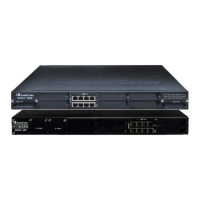CHAPTER60 Configuration Parameters Reference
Mediant 4000 SBC | User's Manual
Parameter Description
■ If the SubjectAltName is not marked as
"critical", the device checks if the FQDN in the
certificate's Common Name (CN) of the
SubjectName is the same as that configured for
the TLSRemoteSubjectName parameter or for
the Proxy Set. If they are the same, the device
establishes a TLS connection; otherwise, the
device rejects the call.
Note:
■ If you configure the parameter to Server &
Client, you also need to configure the
SIPSRequireClientCertificate parameter to
Enable.
■ For FQDN, the certificate may use wildcards (*)
to replace parts of the domain name.
'TLS Client Verify Server Certificate'
configure network >
security-settings > tls-
vrfy-srvr-cert
[VerifyServerCertificate]
Determines whether the device, when acting as a
client for TLS connections, verifies the Server
certificate. The certificate is verified with the Root
CA information.
■ [0] Disable (default)
■ [1] Enable
Note: If Subject Name verification is necessary, the
parameter PeerHostNameVerificationMode must be
used as well.
'TLS Remote Subject Name'
configure network >
security-settings > tls-rmt-
subs-name
[TLSRemoteSubjectName]
Defines the Subject Name that is compared with the
name defined in the remote side certificate when
establishing TLS connections.
If the SubjectAltName of the received certificate is
not equal to any of the defined Proxies Host
names/IP addresses and is not marked as 'critical',
the Common Name (CN) of the Subject field is
compared with this value. If not equal, the TLS
connection is not established. If the CN uses a
domain name, the certificate can also use wildcards
(‘*’) to replace parts of the domain name.
The valid range is a string of up to 49 characters.
Note: The parameter is applicable only if the
parameter PeerHostNameVerificationMode is set to
1 or 2.
'TLS Expiry Check Start'
expiry-check-start
[TLSExpiryCheckStart]
Defines when the device sends an SNMP alarm
(acCertificateExpiryAlarm) to notify that the installed
TLS server certificate is about to expire. This is
defined by the number of days before the
certificate's expiration date. For example, if
configured to 5, the alarm is sent 5 days before the
expiration date. For more information on the alarm,
refer to the SNMP Reference Guide.
The valid value is 0 to 3650. The default is 60.
- 911 -

